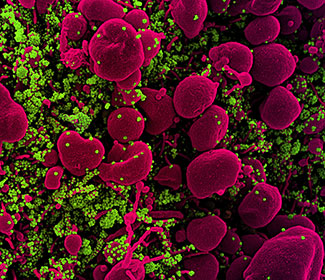Researcher collaborates to solve pandemic inequities at home and abroad
July / August 2020 | Volume 19, Number 4

Courtesy of NIAID
SARS-CoV-2
By Susan Scutti
Some people find opportunity within adversity. Professor Gene Morse of University at Buffalo, State University of New York, is among them. When the March 2020 lockdown suspended his HIV-related work, Morse pivoted his team toward COVID-19 research and looked to Fogarty for inspiration to remedy a stateside problem.
In the earliest days of the pandemic, regional hospitals in Western New York were not equipped to conduct clinical studies and so lacked access to investigational coronavirus treatments for their patients. “To address this, I collaborated with my colleagues at UB and Roswell Park Comprehensive Cancer Center to complete a needs assessment, which is how you start a Fogarty project,” said Morse. Following the appraisal, the team
established the Western New York COVID-19 Research Collaborative, which included some care-based hospitals, so they could participate in studies funded by pharmaceutical companies and offer experimental COVID-19 drugs to their patients. “All of the foundation-building approaches that I learned for developing countries I used right here at home,” said Morse.
Because the pandemic shines a spotlight on virology, it has increased innovation and capacity building, observed Morse. “Previous UB Fogarty trainees have focused on developing research questions to address complex health issues related to virology.” Today these former fellows and Morse’s current team - funded by Fogarty’s global infectious diseases and HIV research training programs - are continuing to collaborate, applying lessons learned to COVID-19. For example, Morse’s group, which includes scientists at University of the West Indies in Jamaica and University of Zimbabwe, had planned a biorepository to examine biomarkers related to disease outcomes resulting from arbovirus infections in Jamaica and HIV in Zimbabwe.
“When COVID-19 occurred, we adapted these projects to focus on genomics, proteomics and meta-omics to identify biomarkers that might predict patients that would progress to more severe disease from SARS-CoV-2,” said Morse. He also is investigating a new approach to point-of-care antibody testing for use in low-resource countries and, in collaboration with the University of Maryland’s Institute of Human Virology project, he is exploring the possibility of activating the immune system with oral polio vaccine to protect against COVID-19 illness.
Even after it subsides, the pandemic will change how scientists collaborate and innovate, Morse believes. “It has created new expectations of what can be planned and implemented in a short period of time, while pointing out inefficiencies in our old system. We have learned how to move things along more quickly.”
More Information
To view Adobe PDF files,
download current, free accessible plug-ins from Adobe's website.
Related Fogarty Programs